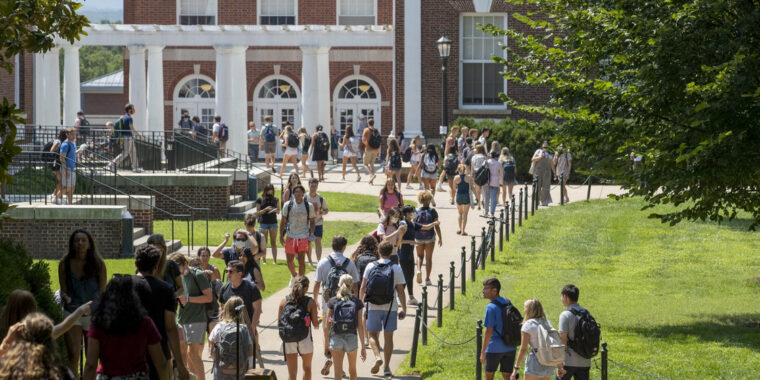
The Foundation for Individual Rights and Expression, known as FIRE, is a leading defender of free speech and free thought on college campuses nationwide. FIRE recently published the 2024 College Free Speech Rankings, ranking UVA as No. 6 nationally for freedom of expression.
The results from the survey of 55,000 college undergraduates at 254 schools also ranked UVA as the No. 1 school in Virginia for freedom of speech.
Earning the speech climate classification of “above average” paints a seemingly impressive picture of the environment on Grounds. One would think students of different mindsets are dancing around a campfire, holding hands and singing folk songs. FIRE and College Pulse’s assigned rankings appear to affirm the various visions that Thomas Jefferson himself aimed for when he founded the University.
“This institution will be based on the illimitable freedom of the human mind,” Jefferson said to William Roscoe, illustrating his desire to create a space for fostering a diversity of perspective, opinion, and subsequent exploration of ideas.
Yet the individual data collected by FIRE clearly negates this optimistic outlook from UVA’s founder. When one takes a deeper dive into the results, the responses highlight a student experience distinctly disparate from the one that is insinuated with the overall ranking of being sixth in the nation for freedom of expression.
Key findings from survey data collected from students at the University of Virginia reveal:
44% of students say they have self-censored on campus at least once or twice a month.
59% of students say they are worried about damaging their reputation because someone misunderstands something they have said or done.
Only 31% of students say they would be comfortable expressing their views on a controversial political topic during an in-class discussion.
77% of students express that they would be somewhat or very uncomfortable publicly disagreeing with a professor about a controversial political topic.
Additional survey data collected speaks volumes. The University of Virginia ranks poorly in various categories assessing student perspectives of free speech and expression. Out of 254 universities and colleges nationwide, UVA placed 222nd for students’ comfort in expressing ideas and 118th for openness in having difficult conversations on campus. This prevalent fear of speaking one’s own thoughts and ideas inhibits authentic exchange, leading the University further and further away from one of the main goals of its founder.
The rankings awarded disguise the larger matter at hand – despite the heavily promoted picturesque appearance of a university that fosters free speech, students feel stifled.
UVA students’ submissions to the FIRE’s survey echo this sentiment:
“As a conservative of color, I have felt deeply apprehensive about discussing my political views in ethnic tied spaces.”
- Member, Class of 2023
“I am transgender, but I am not out of the closet, so I am scared to voice my opinion on transgender-related topics because I am scared of what other students might say to me.”
- Member, Class of 2024
“It’s hard to talk about free speech at UVA considering the controversy a few years ago.”
- Member, Class of 2024
These perspectives indicate that regardless of political ideology or background, free speech efforts are not as championed in the classroom, in shared spaces, and between students as UVA wishes to promote. Instead, the university earned such a high score and top rankings through de facto university policies in place and administrative efforts, such as President Ryan and Provost Baucom’s various instances of outward support for the promotion of free speech – which, while greatly appreciated and admirable, do not quell the tension and underlying animosity that characterizes heated dialogue in classrooms and amongst peers. Their words reach a broad audience of nearly 24,000 students, faculty, and members of the community; however, the support does not translate to direct action on Grounds.
UVA’s national ranking of No. 6 overall for freedom of expression was decided based upon 13 different components. Six of the thirteen criteria assess student perspectives regarding the attitude towards free speech on their campuses. The remaining seven components take into account the behavior of administrators, faculty and students regarding free expression on their campus. Compared to other institutions of higher education, UVA’s administration has outwardly voiced support for freedom of expression. Therefore, the results that assess behavior from administration will suggest a different state of free expression on Grounds than what students might personally perceive.
Additionally, the highly-celebrated score of No. 6 is also due to FIRE awarding bonus points for two separate instances where the administration defended a speaker’s speech rights during a disinvitation attempt and for defending a scholar’s speech rights during a campus controversy. The administration’s backing of speech rights is not taken for granted. Its willingness to tackle large-scale incidents where speech is under threat is again, appreciated; however, it does not assist in resolving the atmosphere that has been cultivated within the academic community and student body.
Grounds is alive with self-censorship, not civil discourse. The juxtaposing perspectives and experiences from members of the UVA community demonstrate inconsistency in protecting one of the most important rights held sacred by all Americans.
In March 2022, recent UVA alum Emma Camp made national headlines with her opinion piece published by the The New York Times, “I came to college eager to debate. I found self-censorship instead.” In my experience, she’s not alone.
The opinions expressed within this piece represent the views of the author alone and do not necessarily reflect the views of The Jefferson Independent.


Excellent piece, Lauren. You speak the truth. Administration pronouncements supporting free speech mean nothing unless backed up by reality in the classrooms as well as enforcement of violations of these guidelines.
The awful fate of Morgan Bettinger and her current lawsuit against the UVA BOV, President Ryan, and former Dean of Students Allen Groves are proof that talk is cheap.
Well done. Good to see journalism as it should be done, telling the entire story of the on the ground reality, vs simply the headline.